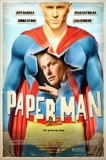| Reviews & Columns |
|
Reviews DVD TV on DVD Blu-ray 4K UHD International DVDs In Theaters Reviews by Studio Video Games Features Collector Series DVDs Easter Egg Database Interviews DVD Talk Radio Feature Articles Columns Anime Talk DVD Savant Horror DVDs The M.O.D. Squad Art House HD Talk Silent DVD
|
DVD Talk Forum |
|
|
| Resources |
|
DVD Price Search Customer Service #'s RCE Info Links |
|
Columns
|
|
|
Paper Man

I usually try not to get all Harry Knowles and make the circumstances under which I saw a film part of its review, because really, who gives a shit. But my experience at the critics' screening of Paper Man colored my interpretation of the film, and, in a small way, both refocused and reconfirmed my approach to how we see films and write about them. I was seated in front of a well-known, "name" critic, though more notable today for his longevity than for anything particularly insightful in his work, which has been largely irrelevant for years now. But out of curiosity, I did some good old-fashioned eavesdropping, and listened as he held court about how terrible all movies are now. This movie stinks, this movie's horrible, none of them are worth a damn, he doesn't even want to write about them. As (basically) an amateur hoping to propel into the ranks of the pros, it was profoundly depressing--not just because a job I'd like to have is in the hands of a bitter person who doesn't like movies anymore, but because he's been doing it so long that he clearly can't find anything to like in good pictures, to say nothing of mediocre ones.
Because the fact of the matter is, it's getting harder and harder to make a truly great movie, or at least one that is not without some flaws. There were maybe a half dozen of them last year. The costs of production and distribution and marketing continue to rise, and the people who determine what money gets spent on which pictures--who have never been a group renowned for their ballsy risk-taking--are only interested in sure things, which means sequels to other hits, films based on'80s artifacts, and remakes of anything that went more than ten dollars into the black, ever. Movies that aren't about giant talking robots blowing things up are an endangered species at the studios; they go the indie route, but that's no shield from the kind of formulization and meddling that makes so many low-budget films into weak sauce.
Take, for example, Paper Man, which is a well-made movie with a good cast that we'd probably forget right away, were it not for one brilliant performance in the middle of it. The actor is Emma Stone, the whiskey-voiced beauty who first made an impression as the object of Jonah Hill's desire in Superbad and was last seen kicking ass and taking names in Zombieland. She's not the main character in the movie, but she's the star, if you know what I mean. The main character is Richard Dunn, played by Jeff Daniels, who has apparently decided (between this, The Squid and the Whale, and The Answer Man) to make damaged writers his specialty. Lisa Kudrow is his sensible wife, Claire, a successful surgeon who has become a bit of a caretaker for her less-than-steady husband. At the beginning of the film, she drives him to a rental cabin in Montauk, where he's isolating himself to write his second novel (after the less-than-enthusiastic response to his first). She then bids him farewell until the weekend, and drives away, leaving him alone with his thoughts--well, alone except for Captain Excellent.
"You didn't bring him out here, did you?" Claire asks of the Captain, played by Ryan Reynolds (he's billed last, which made me smile; for my money, he does best in "and Ryan Reynolds" roles). He did. Since childhood, he's sought the advice and encouragement of his favorite superhero (decked out in tights, a cape, and bleach blonde hair), and it's a tie he's never been able to sever. But Richard has other problems besides the invisible friend. He can't get past the first line of the novel (now there's a cliché about writers whose death I wouldn't mourn). He can't work if that furniture is in the living room. And then there's the babysitter.
The babysitter is Abby (here's where Stone comes in). Richard sees her in town, absently tossing cigarettes into a trash can; she sets it on fire and disappears. He rushes to put the fire out, then follows her. She calls him out, he claims he's looking for a babysitter, she says she's available, and they make arrangements. He doesn't have a baby for her to sit, of course, a fact that she seems strangely unbothered by when she shows up that Friday night. But she rolls with the punches, so he leaves for a while, and then when he comes back, they talk.
In the scenes early in their relationship, we're struck by how interesting the characters are, and we appreciate not being told exactly what they're up to. But at the same time, we need some kind of a way in--we're not sure what their motives are (aside from the self-conscious quirkiness imposed by the narrative), and they wind up rather oblique. But once the friendship is established--whatever the reason for it--we're intrigued.
Daniels is good, but as indicated, he's done this role many, many times before. Stone is the film's real discovery. Her arid-dry delivery in the picture's secret weapon; she can put a punchy spin on even her weakest lines, and gets laughs and sympathy that the script doesn't quite earn. But--and this is key--they also don't fall into the trap of making her wise beyond her years. She's a teenager, and she's screwed up, and she's making bad choices (the portrait of the awkwardness and cruelty of teen sexuality rings particularly true). But she's doing the best she can, and Stone latches on to that and cranks it all the way up. She takes this sometimes tired material (she gets not one, but two big monologues about death) and breathes new life and energy into it. It's a firecracker of a performance.
Kudrow has a couple of strong scenes as well, particularly when she loses patience with her mess of a husband, who she's spent too much of her life taking care of, managing his neurosis. "I think you think this is charming!" she lays into him. "We're not 23 anymore. Pull it together!" Reynolds plays his vanilla superhero/confessor with just the right mixture of bravado and concern, while Kieran Culkin shares a couple of warm moments with his Abby, his longtime crush.
As the picture moves into the third act, it tosses in one of those unfortunate "surprises" that's completely transparent, and everything else pretty much crashes together as expected (Richard and Claire's big falling-out is mostly comprised of lines you've heard before). But the Richard-Abby dynamic remains a sturdy thread, and in their final scene, both Daniels and Stone manage to get at something real and true, even if they're drowning in clichés.
I didn't overhear my colleague's reaction after the screening, but I would imagine he found plenty to complain about in Paper Man; indeed, there is credibility to those complaints. A film like this is easily dismissed because of its predictability, its herky-jerky tone and pace, its occasional clumsy dialogue. But Emma Stone is asked to play some beats in it that would mystify most actors her age, and she doesn't even blink. That may not be enough for a full-on recommendation. But that's something.
Jason lives in New York. He holds an MA in Cultural Reporting and Criticism from NYU.
|
| Popular Reviews |
| Sponsored Links |
|
|
| Sponsored Links |
|
|
| Release List | Reviews | Shop | Newsletter | Forum | DVD Giveaways | Blu-Ray | Advertise |
|
Copyright 2024 DVDTalk.com All Rights Reserved. Legal Info, Privacy Policy, Terms of Use,
Manage Preferences,
Your Privacy Choices | |||||||











